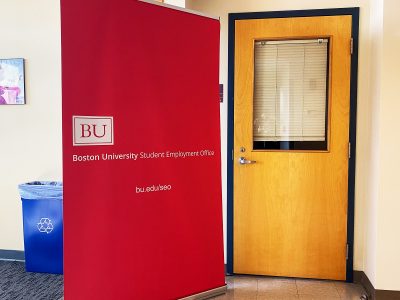It’s the classic teen experience: as early as 14 years old, some Americans are eligible to get their first part-time job.

From there, part-time jobs can lead to full-time jobs, internships and potential careers. For international students studying in the United States, however, getting even that first part-time job is a challenge.
F-1 students, meaning non-immigrant students coming to the United States, can work on school premises or “educationally affiliated” off-campus jobs, such as a research lab affiliated with a school. But, other off-campus jobs are off-limits except for extreme cases, according to the U.S. Immigration and Customs Enforcement.
Jaimie Leung, a sophomore in College of Communication, is an international student from Hong Kong. Leung said for her major, film and television, she would consider staying in the United States, but knows it would be difficult to get the required documentation.
“In the future, I might try applying [for] jobs in the states because of my major,” she said. “The film industry is definitely in the United States because it’s big, but I know it’s hard to apply for … a working visa and everything.”
Leung said getting a sponsorship is one of the obstacles international students face when they’re trying to secure a job. Sponsorship is the process when U.S. businesses can petition for foreign workers so they can begin working in the United States, according to the Bipartisan Policy Center.
Leung said though sponsorship is an option for international students, the process still has barriers, such as expense and time. Filing fees to sponsor a non-immigrant, international student that can reach up to $4,500, according to the U.S. Citizenship and Immigration Services.
“I feel like employers will just get domestic locals, like employ locals, first before getting international students,” she said. “It’s definitely harder to get a job for international students.”
COM sophomore Enni Lyu, an international student from China, said the language barrier can also contribute to the hardships of finding a job.
Lyu said she does not consider herself a fluent English speaker, adding onto why she avoids seeking employment in the United States.
“There’s much to learn,” she said, “and I think if I come to my home country to work, I think it’s more easy.”
She said she decided to come back to China to work after college because she doesn’t feel “comfortable” staying in the United States due to anticipated discrimination in the workforce.
“I feel like there’s some kind of discrimination,” Lyu said. “Before I go to college, I think ‘Oh, I will have a job, I want to apply for a job and I want to stay in America,’ but after I actually study in the university, I feel like ‘Oh, that’s not easy.’”
Because it is difficult to settle down in the United States, Leung said she has been looking at different options for her future.
Canada is high on the list for her — there’s a new policy for Hong Kong immigrants that allows them to obtain a working visa for up to three years after graduation, which eventually leads to permanent residence in the country. This pathway requires a one year of work in Canada and minimum education and language levels.
For international students to have more work opportunities in the United States in the future, Leung said changing governmental policies regarding employment is crucial. During the last presidency, Leung said she felt as if there were very strict policies on international students in general, making it harder for them to obtain a working visa.
Lyu said it is important for employers to consider hiring international students because they provide a diverse perspective — each company should want to hire people from different populations and backgrounds, she said.
“I think people have different way of thinking, solving the problem,” Lyu said. “International students [and] people all over the world bring with them their own culture, their own thinking mode. So, during the work, they may find different ways to solve problems.”
Leung added bringing diversity to the workplace is essential, and changes, such as extending Optional Practical Training past a year for all international students regardless of major, are necessary to help make more advancements.
“Some students came to the United States for a reason,” she said. “They want to work here, and they want to learn the culture … So I think it’s important for them to have a better policy for working visas.”





















































































































